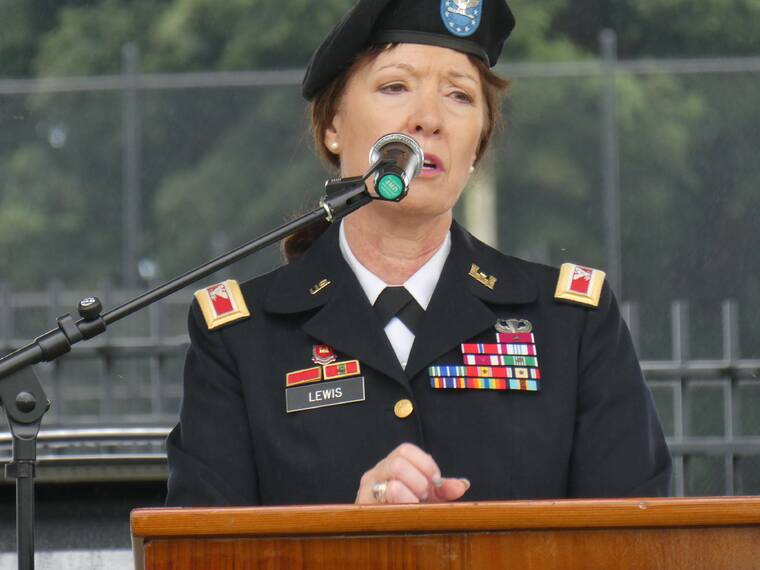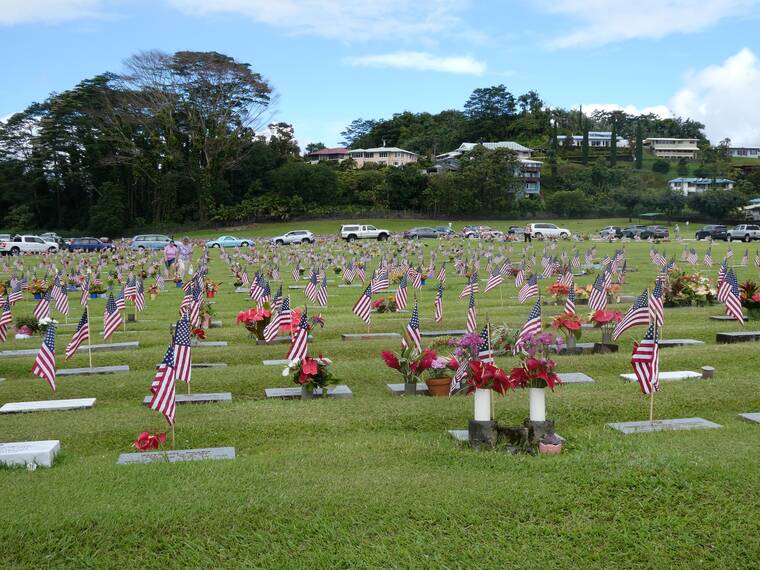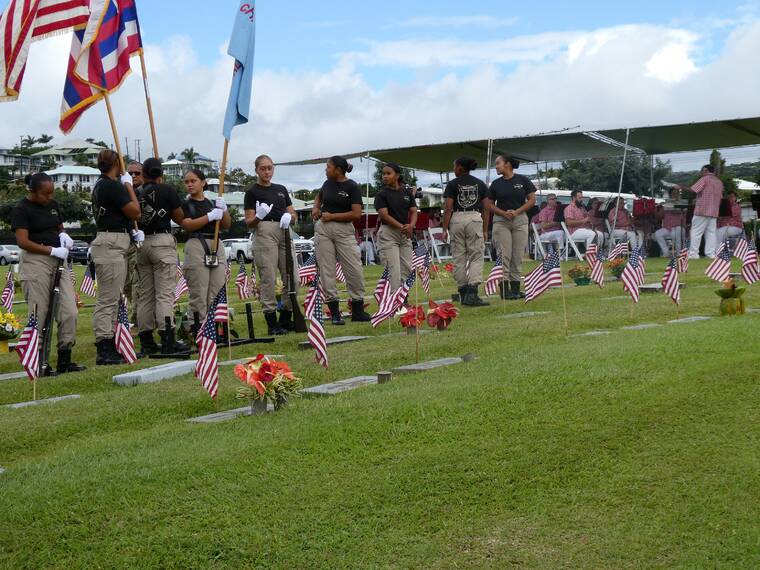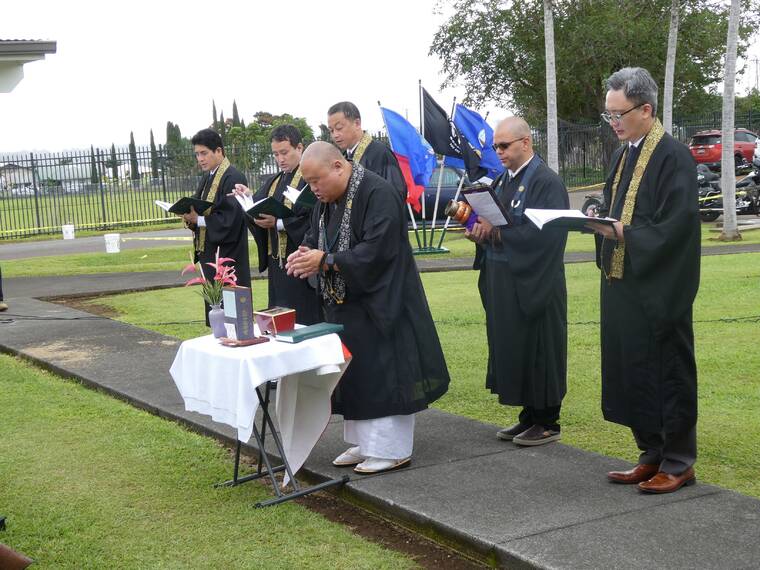Honoring sacrifice and service

JOHN BURNETT/Tribune-Herald Retired U.S. Army Col. Debra Lewis gives the keynote address at the annual Memorial Day commemoration ceremony Monday at East Hawaii Veterans Cemetery No. 2 in Hilo.

JOHN BURNETT/Tribune-Herald U.S. flags and flowers adorn rows of headstones on Memorial Day, Monday, at East Hawaii Veterans Cemetery No. 2 in Hilo.

JOHN BURNETT/Tribune-Herald A color guard of Hawaii National Guard Youth Challenge cadets prepare for the annual Memorial Day commemoration as the Hawaii County Band plays behind them Monday at East Hawaii Veterans Cemetery No. 2 in Hilo.

JOHN BURNETT/Tribune-Herald Ministers of the Big Island Buddhist Federation chant 'Sambutsuge' while an incense offering is prepared at the annual Memorial Day commemoration Monday at East Hawaii Veterans Cemetery No. 2 in Hilo.
Memorial Day is the unofficial start of summer — for many, a day for the beach, a backyard barbecue or to just hang out with family and friends.
Memorial Day is the unofficial start of summer — for many, a day for the beach, a backyard barbecue or to just hang out with family and friends.
But about 100 people took a couple of hours Monday morning at East Hawaii Veterans Cemetery No. 2 to commemorate and to pay respect to those who made the ultimate sacrifice in defense of the nation.
ADVERTISING
The Hawaii County Band played patriotic music, cadets from Hawaii National Guard’s Youth Challenge Academy served as a color guard — and about 160 names of Big Island military veterans who died since last Memorial Day were read and honored with the tolling of a bell, a rifle salute and the playing of “Taps.”
The ceremony’s emcee, Jeno Enocencio, an Army Vietnam War veteran and former American Legion Post 3 Commander, noted Hawaii’s diversity — not just racial and ethnic, but faiths, as well.
“You know, some people might say that this is a Christian event or a Buddhist event or some other religion. But you know, we’re all here together here on this Earth and somehow, somehow, we got to get together and proclaim peace so sacrifices like this are never, never needed,” Enocencio said, his deep voice cracking with emotion.
The keynote speaker, retired Army Col. Debra Lewis, lost her 96-year-old father, Lt. Gen. Bennett Lewis on April 5. Her mother, Malvene Lewis, was at the ceremony with Lewis and her husband, retired Army Lt. Col. Doug Adams, the county’s director of Research and Development.
Lewis paid homage to not just those who fell in battle, but the spouses and families who sacrificed as loved ones deployed to battlefronts far away.
“When I deployed to Iraq, my husband Doug, he had to hold down the homefront. And even though he was much better prepared than most, it was not easy,” Lewis said.
The theme of Lewis’ speech was “United in Aloha,” a motto that appears on pins commemorating her service in 2021 and 2022 as Hawaii’s state commander of the Veterans of Foreign Wars. She described “United in Aloha” as “positive energy, not negative energy.”
“It means … we work closely together for peace,” Lewis said. “We do it from a place of love in our hearts, in our thoughts and, most importantly, in our actions — like the actions today, honoring those who served and gave the ultimate sacrifice, and their families.”
Lewis noted that on May 11, the Army broke a longstanding tradition and changed the names of 10 installations named after Confederate generals in the U.S. Civil War.
“Tradition is great when you know what you’re supporting,” she said. “The Army dared to rename 10 posts. Now before you pass judgment any time, especially for some topic like this, that someone proposes a change, you might want to ask why. Why? And I like to ask, ‘is it unifying, is it united in aloha, or is it divisive?”
One of the bases renamed was Fort Benning, a large Army base in Georgia that trains paratroopers. Lewis noted Gen. Henry L. Benning is reputed to have said he’d rather suffer illness and starvation than see African Americans liberated from slavery and given equality as citizens.
“That installation was built in 1909, OK? Forty-four years after the Civil War,” she said. “Now, think what it was like to live in that area. And, over time, yeah, people forgot what (Benning) stands for. But anyone alive at that time who knew what that represented understood that it was a huge step back.
“So who is it being named after now? May 11, they named it Fort Moore. Who was that? Lt. Gen. Hal Moore and his wife, Julia. It was named for both of them.”
The Moores were depicted in the 2002 film “We Were Soldiers,” based on Lt. Gen. Moore’s 1992 book “We Were Soldiers Once… and Young.” Co-written by Joseph L. Galloway, the book dramatizes the Battle of la Drang, the first major battle between U.S. and North Vietnamese forces, in November 1965.
The movie was written and directed by Randall Wallace, who was vocal about wanting to be as accurate as possible.
“It’s not just depicting it from one side. He actually depicted it from both sides. And most importantly, he depicted it from the spouse’s side,” Lewis said. “… The battle impacts not just those fighting it, but those at home. And not just those who were killed there, but those who come back broken. And the families and others have to take care of them.”
The Vietnam War was the first with skirmishes piped into America’s living rooms every evening on television, and Lewis noted the conflict’s unpopularity with the American public.
“So you have the nightly news, you have the discussions going on and the toll that was taken,” she said. “How did these families get through it? Many ways, not all of them good. The cost of war is huge. And those in the political realm who say, ‘Let’s fight, let’s go to war’ — they have no clue as to the impact. And fewer and fewer have served in the military. And, as you know, all the families affected by war are working their way through it. So the best way to pay tribute to the veterans’ spouses … you have to listen to those stories, because those stories matter. And sometimes, it hurts. But the more you tell it, the easier it gets.
“You see, we’re all connected here.”
Lewis also tipped her beret to organizations who help veterans’ families and caregivers, including the Elizabeth Dole Foundation and local Dole Foundation caregiver fellow, Ho‘ola Farms, a nonprofit that serves military veterans, caregivers, first-responders and their families by providing opportunities to heal, connect, learn, grow and thrive.
“We have to prepare, just like our military, we have to prepare for battles and win these battles,” she said. “The cost is huge. Those who lose their lives, those who are broken — and all those loved ones, we have to sacrifice to support them.
“But without that sacrifice, we wouldn’t be able to assemble here in a free country, to live full lives and experience our joy in life, each and every day — and be able to pay our respects to our veterans’ spouses and to honor them today.
Email John Burnett at jburnett@hawaiitribune-herald.com.


